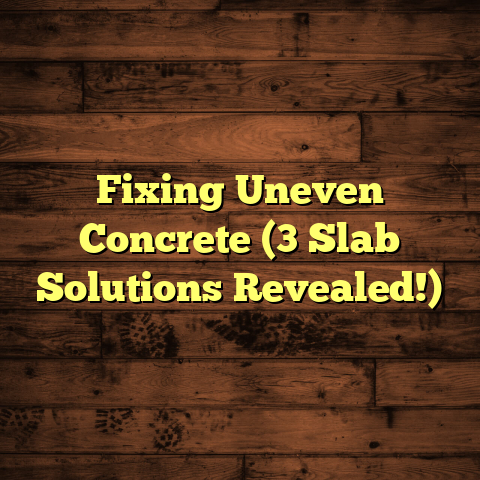Cost to Refinish Hardwood Floors in South Africa
Refinishing hardwood floors is a popular choice among homeowners in South Africa looking to restore the beauty of their wooden floors while extending their lifespan.
This comprehensive guide will explore the costs associated with refinishing hardwood floors, the factors that influence these costs, and the considerations homeowners should keep in mind.
With detailed breakdowns, comparisons to alternative flooring options, and expert advice, this article aims to be the go-to resource for anyone considering hardwood floor refinishing.
Overview of Major Cost Factors
Several key factors impact the cost of refinishing hardwood floors, including:
1. Area Size
The total square meterage of the floor that needs to be refinished is perhaps the most significant determinant of cost.
Larger areas will naturally incur higher labor and material costs.
For example, refinishing a 20-square-meter room will be less expensive than refinishing a 100-square-meter open-plan living area.
2. Hardwood Type
Different types of hardwood vary in price, with exotic woods typically costing more than domestic varieties.
The choice of wood can significantly affect both the cost of refinishing and the final appearance.
Common hardwoods like oak and maple are generally more affordable than rarer species such as teak or mahogany.
3. Labor Costs
Hiring professionals for refinishing can be costly, but their expertise often ensures a higher quality finish.
Labor costs can vary widely depending on the contractor’s experience and the region in which you live.
For instance, urban areas may have higher labor rates due to increased demand for skilled tradespeople.
Additionally, specialized services, such as eco-friendly finishes or intricate designs, can further elevate labor costs.
4. Additional Considerations
Floor Removal
If the existing floor needs to be removed before refinishing, this will add to the overall costs.
The removal process can involve labor-intensive work and disposal fees for old materials.
Subfloor Replacement
Any damage to the subfloor that requires repair or replacement will also impact costs.
A compromised subfloor can lead to uneven surfaces and may necessitate additional materials and labor.
Material Grade
Higher-grade finishes and materials will increase costs, but they may provide better durability and aesthetics.
For example, a high-quality polyurethane finish can cost more but offers superior protection against wear and scratches compared to lower-grade options.
Room Size/Layout
Complex layouts or rooms with many angles may require more labor, increasing costs.
For instance, rooms with intricate architectural details may need more careful preparation and cutting of materials.
Installation Type
Different refinishing methods (e.g., sanding vs.
chemical stripping) can have varying costs associated with labor and materials.
Sanding typically requires more intensive labor but often yields better results compared to chemical methods.
Wood Type
The type of wood can affect both the refinishing process and the finish itself, influencing overall costs.
Hardwoods with dense grains may require more effort and specialized equipment during the sanding process.
Detailed Cost Breakdown
Average Costs for Refinishing
The cost to refinish hardwood floors in South Africa generally ranges from R80 to R150 per square meter, depending on the factors mentioned above.
Here’s a more detailed breakdown based on project size and complexity:
- Small Areas (up to 50 sqm):
- Cost Range: R4,000 – R7,500
- Typically includes sanding, staining, and applying finish.
- Medium Areas (50 sqm to 100 sqm):
- Cost Range: R8,000 – R15,000
- May include some repairs or additional treatments for older wood.
- Large Areas (over 100 sqm):
- Cost Range: R16,000 – R30,000+
- Larger projects often benefit from economies of scale but may require more complex logistics.
Factors Affecting Cost Variability
- Condition of Existing Floor: If the floor is severely damaged or has multiple layers of old finish that need to be removed, expect higher costs.
- Finishing Options: Additional costs for premium finishes can range from R500 to R1,500 extra depending on the product used.
- Geographical Location: Urban areas tend to have higher labor rates compared to rural areas.
Example Cost Scenarios
To provide a clearer picture of potential costs, let’s look at a few hypothetical scenarios:
- Scenario One: Small Living Room
- Size: 30 sqm
- Condition: Moderate wear with some scratches
- Estimated Cost:
- Labor: R80/sqm x 30 = R2,400
- Materials (finish): R2,000
- Total Estimated Cost: R4,400
- Scenario Two: Large Dining Room
- Size: 70 sqm
- Condition: Severe wear with water damage in spots
- Estimated Cost:
- Labor: R120/sqm x 70 = R8,400
- Materials (premium finish): R3,000
- Repairs (subfloor): R2,000
- Total Estimated Cost: R13,400
- Scenario Three: Open-Plan Living Space
- Size: 120 sqm
- Condition: Minor scratches and fading
- Estimated Cost:
- Labor: R100/sqm x 120 = R12,000
- Materials (standard finish): R4,000
- Total Estimated Cost: R16,000
Comparison with Alternative Flooring Options
When considering refinishing hardwood floors, it’s essential to compare costs with alternative flooring options:
Laminate Flooring
- Cost: R200 to R500 per square meter installed.
- Pros: Less expensive upfront and easier to install.
- Cons: Less durable than hardwood and cannot be refinished.
Vinyl Flooring
- Cost: R150 to R400 per square meter installed.
- Pros: Water-resistant and available in various styles.
- Cons: Can look less authentic compared to real wood.
Carpet
- Cost: R200 to R600 per square meter installed.
- Pros: Comfortable underfoot and warmer in colder climates.
- Cons: Requires more maintenance and does not last as long as hardwood.
Summary of Costs
Signs Your Hardwood Floors Need Refinishing or Replacement
Homeowners should be aware of several signs that indicate whether their hardwood floors need refinishing or complete replacement:
Signs That Refinishing is Needed
- Visible Wear and Tear: Scratches, dents, and faded areas are signs that refinishing may be necessary.
- Loss of Luster: If your floor appears dull and lacks shine despite regular cleaning, it may be time for a refinish.
- Minor Scratches: Light scratches or scuff marks are often easily corrected through sanding and resealing.
- Discoloration: Stains from spills that do not come out with cleaning might indicate that refinishing could restore uniformity.
- Noise Issues: Squeaky floors can sometimes be resolved through refinishing if it’s due to lack of finish rather than structural issues.
Signs That Replacement is Required
- Water Damage: If water damage is extensive, replacement might be more cost-effective than refinishing.
- Cupping or Warping: Significant structural issues often indicate that replacement is required.
- Persistent Odors: If odors persist despite cleaning, this could signal underlying damage that necessitates replacement.
- Severe Cracking: Deep cracks that compromise structural integrity are usually beyond repair through refinishing.
- Insect Infestation: Damage from pests can severely weaken hardwood floors and typically requires replacement.
Pros and Cons of Hardwood Flooring
Pros
- Aesthetic Appeal: Hardwood floors are timeless and add value to homes.
- Durability: When properly maintained, hardwood floors can last for decades.
- Refinishing Capability: Unlike many flooring types, hardwood can be sanded and refinished multiple times.
- Variety of Styles: Available in numerous species and finishes, allowing for customization in design.
- Sustainability: Many hardwoods are sourced from sustainably managed forests; plus, they can be recycled or repurposed at the end of their life cycle.
Cons
- Cost: Initial installation and refinishing costs can be high.
- Maintenance: Requires regular upkeep to maintain appearance.
- Susceptibility to Moisture: Can warp or swell if exposed to water.
- Noise: Hardwood can be noisier than carpet or vinyl when walked on.
- Temperature Sensitivity: Can expand or contract with changes in humidity and temperature.
Professional Installation vs. DIY
The choice between hiring a professional or undertaking a DIY project comes with its own set of cost considerations:
Professional Installation Costs
Generally range from R80 to R150 per square meter for labor alone.
This includes expert knowledge and tools that ensure a quality finish.
Benefits of Professional Installation:
- Expertise: Professionals have the skills necessary to handle complex issues that may arise during the process.
- Quality Assurance: Experienced contractors often guarantee their work for a certain period post-installation.
- Time Efficiency: Professionals can typically complete jobs faster than individuals without experience.
DIY Costs
- Tools needed (sander, finish applicator, etc.): Approximately R1,500 to R5,000 depending on what you already own.
- Potential savings but requires significant time investment and skill.
Challenges of DIY:
- Learning Curve: Lack of experience may lead to mistakes that could result in additional costs down the line.
- Time-Consuming: Preparing, sanding, staining, and finishing can take significantly longer without prior experience.
- Possible Need for Repairs: Mistakes made during DIY could necessitate professional correction later.
Importance of Proper Installation
Improper installation can lead to issues such as warping, squeaking, or uneven surfaces.
It’s crucial to understand that while DIY can save money, it requires knowledge of techniques that professionals have mastered over years.
Questions to Ask Hardwood Flooring Contractors
When hiring a contractor for refinishing your hardwood floors, consider asking:
- What is your experience with hardwood floor refinishing?
- Can you provide references from previous clients?
- What methods do you use for sanding and finishing?
- Are you insured and licensed?
- What is included in your estimate?
- How do you handle unexpected issues during the project?
- What type of finish do you recommend based on my wood type?
- How long will the project take from start to finish?
- What preparations do I need to make before you arrive?
- Do you provide any warranties on your work?
Hardwood Floor Care and Maintenance Tips
To maximize the longevity of your hardwood floors after refinishing:
- Regular Cleaning:
- Sweep or vacuum regularly to remove dirt and debris.
- Use a damp mop for cleaning; avoid excessive water which can damage wood.
- Protective Measures:
- Use rugs in high-traffic areas to minimize wear.
- Place felt pads on furniture legs to avoid scratches when moving items.
- Refinishing Schedule:
- Plan to reapply finish every few years based on wear patterns observed.
- Consider consulting with professionals about when it might be time for another refinish based on your specific flooring type and usage patterns.
- Temperature Control:
- Maintain consistent indoor humidity levels (ideally between 30% and 50%) to prevent warping or cracking.
- Use humidifiers or dehumidifiers as necessary based on climate conditions.
- Prompt Repair of Damage:
- Address scratches or scuffs immediately using touch-up kits designed for hardwood floors.
- For deeper gouges or stains, consult professionals on appropriate repair methods before considering a full refinish.
- Preventative Maintenance:
- Avoid wearing shoes with hard soles indoors.
- Clean spills immediately to prevent staining or water damage.
- Seasonal Care Tips:
- During winter months, consider using mats at entryways to reduce salt damage from snow-covered shoes.
- During summer months, ensure proper ventilation in high humidity situations which can lead to moisture-related issues.
Additional Considerations for Refinishing Hardwood Floors
Eco-Friendly Options
With growing awareness about sustainability, many homeowners are interested in eco-friendly finishes that are less harmful to indoor air quality:
- Water-Based Finishes: These options have lower volatile organic compound (VOC) emissions compared to oil-based products.
- Natural Oils: Options such as tung oil provide a more environmentally friendly approach while enhancing wood grain visibility without harsh chemicals.
The Importance of Choosing the Right Finish
The choice of finish significantly affects both appearance and durability:
- Polyurethane Finishes:
- Available in water-based and oil-based versions.
- Water-based finishes dry faster but may not provide as rich a color as oil-based options.
- Wax Finishes:
- Offer a softer sheen but require more frequent reapplication.
- Not as durable against moisture compared to polyurethane options.
Trends in Hardwood Flooring
Homeowners are increasingly leaning towards trends that enhance both aesthetics and functionality:
- Wide Plank Flooring: Offers a modern look while showcasing natural wood grain patterns.
- Matte Finishes: Growing in popularity as they provide a more natural appearance while also hiding scratches better than glossy finishes.
- Mixed Materials: Combining hardwood with other flooring types (like tile) allows for creative designs while maintaining durability in high-moisture areas like kitchens or bathrooms.
Conclusion
Refinishing hardwood floors in South Africa can vary significantly in cost based on several factors such as area size, wood type, labor costs, and additional considerations like repairs or complex layouts.
Understanding these nuances is essential for homeowners looking to invest wisely in their flooring projects.
This comprehensive guide has covered everything from average costs associated with refinishing hardwood floors to signs indicating when replacement might be necessary—and even how to maintain your floors after refinishing them successfully.
By weighing all options carefully—considering both professional services versus DIY approaches—and asking informed questions when seeking contractors’ help, homeowners can ensure they make the best decisions regarding their flooring needs for years to come.





